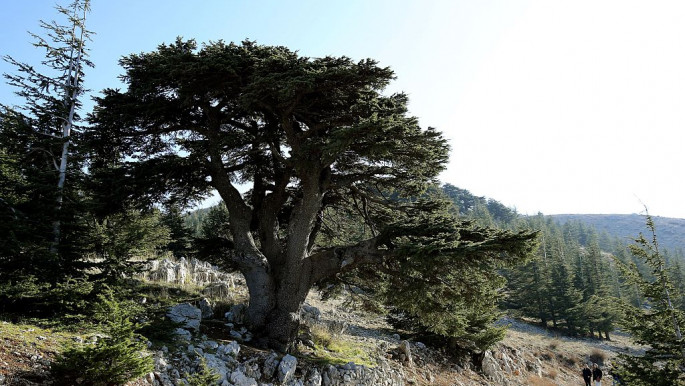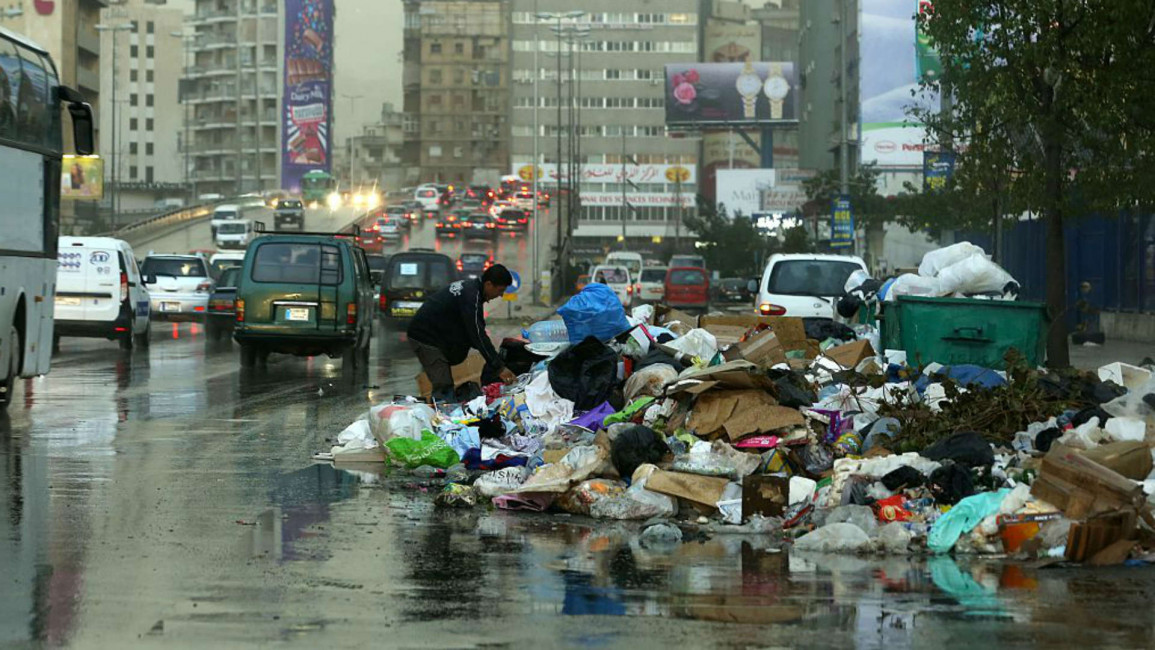
Lebanon's biospheres of sorrow
It was only three years ago that the country found itself mired in a garbage catastrophe which led to the largest protests in recent times, other than those organised by a political party.
More than 100,000 citizens - fed up with the government's ineptitude and refusal to deal with the mountains of rubbish that had collected on the streets of Beirut and Mount Lebanon - gathered on Riad el-Solh Square in theatrical displays of indignation and solidarity.
In their minds, the garbage crisis epitomised the deep rot of corruption and fraudulence that had come to subsume Lebanon's government and political class since the end of the civil war nearly three decades earlier.
The crisis was well documented and the rubbish has since been picked up; the outcome of a series of negotiations between Lebanese officials and the contracted, private waste collection agency, Sukleen.
Yet in the two years that separates us from the events of 2015, Lebanon's environment remains just as fetid, hazardous, and dire.
Any government accountability has all but disappeared, and the situation has been compounded by the arrival in Lebanon of 1 million Syrian refugees since 2012, many of whom are yet to be properly accommodated by the Lebanese government.
 |
To say the country is struggling to cope with the cornucopia of large scale economic, infrastructural, environmental and humanitarian issues would be an understatement |  |
Resources surpassed their breaking point long ago, and Lebanon has garnered some of the highest public debt in the world (over 140 percent of its GDP as of 2015).
Finally, let us not forget the 450,000 Palestinian inhabitants starved of their basic civil rights and still confined to makeshift camps with less than adequate sanitation, abysmal housing, and ineffective sewage treatment.
To say the country is struggling to cope with the cornucopia of large scale economic, infrastructural, environmental and humanitarian issues would be an understatement. More accurately, in 2017 Lebanon teeters of the precipice of complete and total implosion.
Twitter Post
|
Lebanon's environment is facing challenges on multiple fronts: Air pollution, deforestation, water contamination and waste management.
While it may not be evident from this portrait of a country in disrepair, Lebanon is indeed a holder of significant environmental and natural capital. It is home to 9,000 different terrestrial and aquatic species, and posseses one the highest concentrations of floral varieties in the Mediterranean basin.
In spite of this, these natural assets are under extreme stress caused by human activity and climate change.
Anyone familiar with the country and its pervasive, idealised narratives knows how the Lebanese love to talk about their country as a place where you can ski in the mountains in the morning and sunbathe on the beach in the afternoon.
Alas, the snow-caps are turning to slush as a result of increasing temperatures and the waters along the coast have suffered tremendously at the hands of factories dumping hazardous waste into the Mediterranean.
But ignorant and reckless factory owners discharging their toxic bi-products into the Mediterranean are not the sole cause of the crisis, the brazenly stupid actions of the government and greedy private contractors hired to perform tasks normally allocated to the public sector are also to blame.
 |
As the cedars die off, so too does the only unifying symbol in a country so divided |  |
As recently as June of this year, anger flared when it was discovered that the government had struck a deal with a private contractor to dump 20 years worth of rubbish from the Bourj Hammoud refuse site into the sea, endangering marine life and posing serious health risks.
 |
|
| Numbers of Lebanon's famous cedar trees are dwindling [AFP] |
As a result of unregulated and rampant deforestation, the Cedar Forests have shrunk from a once mighty 500,000 hectares to a vastly diminished 2,000 hectares. Though the trees have now gained protected status, rising temperatures and an unpredictable climate pose seemingly unsurmountable challenges to the restoration of the forests.
Shorter winters and longer summers disrupt cedars' natural reproduction, suggesting these forests are facing a bleak future.
A changing climate also encourages increased insect activity and development which, in turn, weakens the trees rendering them more vulnerable to diseases that could ultimately kill them.
Climate recognises no law or protected statuses. Neither, for that matter, do insects.
As the cedars die off, so too does the only unifying symbol in a country so divided. The cedar graces our flag, our currency and our national airline, but the fate of the forests is historically and inextricably linked to the fate of Lebanon.
Like the rubbish crisis of 2015, the fragile state of the cedars provides a bitter reflection of the country's unstable politic and national failure.
The Syrian refugee crisis shows no signs of abating any time soon. This is the second time in 70 years that Lebanon has hosted refugees fleeing persecution and violence. The first occurred during the 1948 Palestinian Nakba, when over 700,000 Palestinians were expelled from Palestine.
It imperative to note here, that the tired myths that refugees are the root cause of Lebanon's woes are absolutely unfounded. In the case of the Syrians and Palestinians who opted to live in a foreign and hostile land rather than suffering and dying in their homes, it is unequivocally the fault of the sectarian Lebanese government for failing to provide our guests with adequate support and infrastructure.
Though the Lebanese government maintains an open-door policy to Syrians fleeing the civil war, the government never signed the 1951 Refugee Convention which protects a refugee belonging to a country where his or her life and freedom are threatened.
 |
From the outset, Lebanon's government should have worked to bolster sustainable development alternatives rather than opting for its historically preferred choice of inaction |  |
Thus, there is simply no international standard to which Lebanon can be held. Palestinian and Syrian refugees alike have been resettled in makeshift shelters located in flood-prone areas.
Settling populations in these areas leads to the unsanitary and illegal dumping of waste which, subsequently, leaches into key water sources.
From the outset, Lebanon's government should have worked to bolster sustainable development alternatives rather than opting for its historically preferred choice of inaction. But that opportunity has come and gone.
Lebanon's government is "deliberately" weak because its sectarian leaders have designed it to be so. There is a sick pragmatism at play here, and the evidence is smeared across the entire country.
No electricity? Let civilians buy their own generators. Trash crisis? Hire private subcontractors to do our job for us. Influx of refugees? Put them in shanty villages and hide them behind concrete walls.
I began this piece by calling out Lebanese civilians and their government's reliance on circumvention as opposed to meaningful and pragmatic action. But civilians are just working with what they get. They are the inheritors of their government's domestic and international policy choices.
 |
When will this gross and calculated incompetence end? |  |
When will this gross and calculated incompetence end? The Lebanese people, their environment, and the refugees who have sought shelter within the country's borders have suffered enough.
I do not claim to know the solutions that will deliver the country from the clutches of a self-serving government, but civil action is a vital component to a healthy functioning democracy.
Without it, we cannot effectively contend with the corrupt and fractured power structures that comprise this non-state, state. Concerned citizens must continue to remind the government that their lives and the ecological life of the country are worth more than the subjugation they have endured for decades.
Myra Al-Rahim is an, activist, radio producer, and researcher based in New York. After graduating in 2016 from Bard College, she has worked for organisations such as PEN: America and the Arab-American Family Support Centre.
Opinions expressed in this article remain those of the author and do not necessarily represent those of The New Arab, its editorial board or staff.



